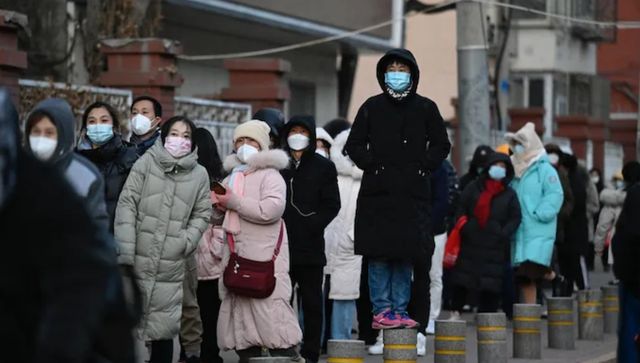A spurt in COVID-19 cases in China has triggered worry across the globe about a potential new variant emerging from the current outbreak.
Due to China’s stringent zero-COVID policy, its population has a low level of immunity with many lacking natural antibodies. Now that the country has abruptly eased the restrictions, the burden on medical facilities has increased amid the new wave of infections.
The apt situation in China remains unclear since it suspended mass PCR testing, decided not to count asymptomatic infections since they’ve become “impossible” to track and narrowed its way of counting the COVID-19 death toll.
India is also on alert as its neighbour tackles the new wave believed to be spurred by BF.7 sub-variant of Omicron.
Which others variants have been reported in China in the past few months? What are the concerns about the emergence of new strains? We explain.
COVID variants in China
BF.7 variant is apparently driving the infection in Beijing.
Xu Wenbo, director of China’s National Institute for Viral Disease Control and Prevention, told Hong Kong-based newspaper South China Morning Post that around 130 Omicron sub-lineages have been reported in China in the last three months, including BQ.1 and XBB strains.
Xu said that while BA5.2 and BF.7 remain dominant in China, “BQ.1 and its sub-lineage have been found in 49 cases in nine provinces, while XBB sub-lineages have been found in 11 cases in three provinces”.
Quick Reads
View AllAccording to the World Health Organization (WHO), the potential impact of the BQ.1 and XXB sub-lineages “is strongly influenced by the regional immune landscape”.
Wang Guangfa, a respiratory expert from Peking University First Hospital, has warned that Beijing could experience a peak in COVID-19 cases in the coming two weeks, a state-run Global Times report said.
Wang expects China to witness a COVID-19 peak by 22 January, while life is likely to “return to normal” around February end and the beginning of March, the report added.
Meanwhile, the Asian giant has established a nationwide network of hospitals to keep track of COVID-19 mutations.
ALSO READ: How China’s sudden switch from zero-COVID policy has burdened its hospitals
Possibility of new variants
Experts are wary that waves of coronavirus cases in China could lead to the cropping up of new strains.
“There will certainly be more Omicron subvariants developing in China in the coming days, weeks and months, but what the world must anticipate in order to recognize it early and take rapid action is a completely new variant of concern," Daniel Lucey, a fellow at the Infectious Diseases Society of America, was quoted as saying by Bloomberg.
“It could be more contagious, more deadly, or evade drugs, vaccines and detection from existing diagnostics,” Lucey noted.
Xu has predicted that the transmission of new sub-variants such as BQ.1 and XBB will speed up over time and mutations will continue to happen.
“As long as it circulates in the crowd, when it replicates, it will mutate,” he said, as per South China Morning Post.
Last week, Dr Anthony Fauci, the top US infectious disease expert, cautioned that China could witness a wave of mutations if it does not “mount and implement a proactive vaccination campaign.”
“Whenever you have a large wave of transmissions of a virus, you give it ample opportunity to mutate," Fauci said at an event organised by the Financial Times.
“And when you give a virus the opportunity to mutate, that allows it to form potentially new variants. And once you get a brand-new variant, that could have an impact on the rest of the world,” he forewarned.
There are two possible trajectories the virus could take in China.
Firstly, it is expected that Omicron and its numerous subvariants may hit China in several waves, leaving no space for other strains like it happened in the rest of the world, says Bloomberg.
“It might be that China catches up, and what comes out is more of what we have already seen," Stuart Turville, a virologist at the University of New South Wales’ Kirby Institute, said.
The other prospect is that a new strain might develop as Omicron did in southern Africa in November 2021.
Omicron “came out of nowhere," Turville told Bloomberg.
“It made an evolutionary change in a way that’s different. If that’s the path, and it spreads more easily, there might be another parachuting event, where it takes a trajectory we don’t expect,” the virologist elaborated.
ALSO READ: Peach Panic: Why people in China are hoarding the canned yellow fruit
Moreover, the virus is not under much pressure to mutate in the country as the population has not had much exposure to it previously.
Alex Sigal, a virologist at the Africa Health Research Institute in Durban, told Bloomberg that in China the virus is “going through a population that doesn’t have a lot of immunity. Just because there are more infections doesn’t mean we’ll have nastier infections”.
Stephen Goldstein, an evolutionary virologist at the University of Utah, says he is not very concerned about China reporting dangerous mutations of the virus.
“I don’t think the situation in China significantly affects the situation everywhere else”, he stated, as per Bloomberg. “Could something out of the blue emerge and cause problems? Maybe - but we can’t predict it and it isn’t what I expect”, the expert stated.
Maria Van Kerkhove, the World Health Organization’s Covid-19 technical lead, stated the notion that the virus will become milder is “false”.
“It could - and we hope so - but that’s not a guarantee”, Kerkhove said, as per Bloomberg.
With inputs from agencies
Read all the
Latest News,
Trending News,
Cricket News,
Bollywood News,
India News and
Entertainment News here. Follow us on
Facebook,
Twitter and
Instagram.


)

)
)
)
)
)
)
)
)



